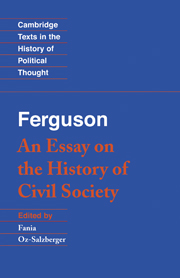Book contents
- Frontmatter
- Contents
- Introduction
- Chronology of Ferguson's life
- Biographical notes
- Bibliographical guide
- A note on the text
- Acknowledgements
- An Essay on the History of Civil Society
- Contents
- PART I Of the General Characteristics of Human Nature
- PART II Of the History of Rude Nations
- PART III Of the History of Policy and Arts
- PART IV Of Consequences that result from the Advancement of Civil and Commercial arts
- PART V Of the Decline of Nations
- PART VI Of Corruption and Political Slavery
- List of variants
- Index
- Title in the series
PART II - Of the History of Rude Nations
Published online by Cambridge University Press: 05 June 2012
- Frontmatter
- Contents
- Introduction
- Chronology of Ferguson's life
- Biographical notes
- Bibliographical guide
- A note on the text
- Acknowledgements
- An Essay on the History of Civil Society
- Contents
- PART I Of the General Characteristics of Human Nature
- PART II Of the History of Rude Nations
- PART III Of the History of Policy and Arts
- PART IV Of Consequences that result from the Advancement of Civil and Commercial arts
- PART V Of the Decline of Nations
- PART VI Of Corruption and Political Slavery
- List of variants
- Index
- Title in the series
Summary
Of the Informations on this subject which are derived from Antiquity
The history of mankind is confined within a limited period, and from every quarter brings an intimation that human affairs have had a beginning. Nations, distinguished by the possession of arts, and the felicity of their political establishments, have been derived from a feeble original, and still preserve in their story the indications of a slow and gradual progress, by which this distinction was gained. The antiquities of every people, however diversified, and however disguised, contain the same information on this point.
In sacred history, we find the parents of the species, as yet a single pair, sent forth to inherit the earth, and to force a subsistence for themselves amidst the briers and thorns which were made to abound on its surface. Their race, which was again reduced to a few, had to struggle with the dangers that await a weak and infant species; and after many ages elapsed, the most respectable nations took their rise from one or a few families that had pastured their flocks in the desert.
The Grecians derive their own origin from unsettled tribes, whose frequent migrations are a proof of the rude and infant state of their communities; and whose warlike exploits, so much celebrated in story, only exhibit the struggles with which they disputed for the possession of a country they afterwards, by their talent for fable, by their arts, and their policy, rendered so famous in the history of mankind.
- Type
- Chapter
- Information
- Ferguson: An Essay on the History of Civil Society , pp. 74 - 105Publisher: Cambridge University PressPrint publication year: 1996

